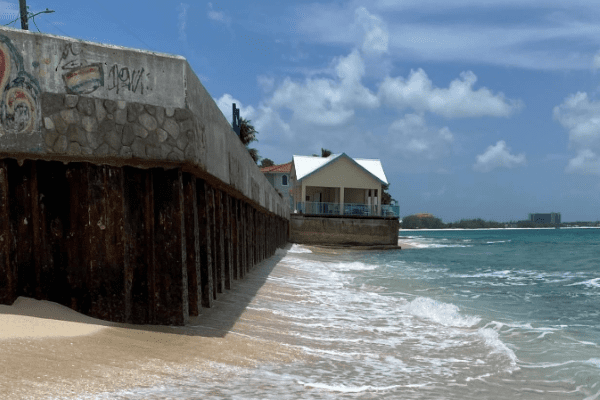[ad_1]

(CNS): The Cayman Islands Court of Appeal has dismissed the Central Planning Authority’s appeal challenging a direction from the National Conservation Council that it should not grant planning permission for the redevelopment of a beachfront cabana on Boggy Sand Beach. The high court confirmed on Friday that the National Conservation Act provides the NCC with the ability to direct government bodies when their actions could have an adverse effect on protected areas or species.
The court also found that the NCC has the power to delegate decisions to the director of the Department of Environment and had validly exercised that power in this case.
The court directed that the case go back to the CPA to rehear the application. This will include the directions, as originally submitted by the DoE director, to refuse this application because of the threat it poses to the marine environment, given its proximity to the sea. The ruling also confirms a long-running dispute between the two entities regarding the power the NCC has to direct the CPA via the DoE under the conservation law.
The controversial case, which pitted two government entities against each other, began when the CPA granted planning permission for the redevelopment of a seawall and a cabana in West Bay that was virtually in the sea. The DoE sought a judicial review, and the Grand Court ruled that the CPA should have followed the NCC and DoE directions. However, the CPA appealed on the ground that the directions were unlawful.
Following today’s ruling, Premier and Minister for Sustainability Wayne Panton, who steered the law through parliament (then called the Legislative Assembly) in 2013, said he hoped this latest decision would enable all parties to move forward.
“This latest ruling once again confirms the legal basis for factoring environmental concerns into decision-making processes across the Cayman Islands Government, particularly where actions may or are likely to have an adverse effect on a protected area or protected species critical habitat,” he said. “I am comfortable that the courts have settled this matter once and for all and there can be no more room for debate. Our government agencies and boards must move forward according to the law, working collaboratively to advance the country’s vision for sustainable development that balances our built and natural environment.”
The battle that played out in the courts illustrated the strains between the premier and Planning Minister Jay Ebanks, who did not prevent the CPA from challenging what has been shown by two courts to be the lawful directions of the NCC.
Panton said, “Not only have the courts spoken, but the people of the Cayman Islands are making their voices heard loud and clear. They understand the links between a healthy environment, a prosperous economy and a vibrant society and culture, and they want to see the government actively taking steps to prioritise sustainable development that benefits all people of the Cayman Islands now and in future.”
The NCC has very limited powers when it comes to directing the CPA, and the Court of Appeal ruling does not change this. As welcome as this ruling is for the NCC, it does not add any new delays or deterrents to the planning process, leaving the CPA to continue granting planning permission in the vast majority of cases, even when the environment is threatened.
DoE Director Gina Ebanks-Petrie said she hoped the latest ruling would put an end to misinformation about the role and powers of the NCC.
“From the outset, our only goal has been to clarify the law,” she said. “Since the National Conservation Act was passed unanimously by Parliament in 2013, the NCC has always been able to direct government entities to refuse a proposal that could have a negative impact on a designated protected area or the critical habitat of a protected species, where conditions of approval are unable to mitigate those adverse effects.”
Ebanks-Petrie explained that this ruling merely clarifies that government entities that do not follow those directions are acting unlawfully. “The NCC may only direct conditions of approval or refusal in very limited circumstances — when the proposal could have a negative impact on a designated protected area or the critical habitat of a protected species,” she said. “The vast majority of planning applications do not fall into this category.”
Despite the criticisms of the law among the development community, the NCC and the technical experts at the DoE have only directed the CPA to refuse planning permission on a handful of occasions since the law was passed some ten years ago. The requirement for EIA’s has also only ever been directed for a very small number of planning applications.
However, the DoE regularly submits detailed submissions on planning applications, offering recommendations for conditions that the CPA could apply when granting planning approval that would protect the environment and follow the government’s climate change and energy policies.
However, the CPA rarely imposes any of the suggested conditions that relate to protecting the environment and continues to preside over applications that involve the removal of mangroves and primary habitat.
See here for more information on what the ruling means.
See the appeal court ruling in the CNS Library.
[ad_2]
Source link

